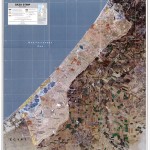Israel-Palestine: Former Israeli Head of Negotiations "No Agreement in Foreseeable Future"
 Monday, January 25, 2010 at 7:34
Monday, January 25, 2010 at 7:34  Udi Dekel, who headed Israel's negotiating team during the Ehud Olmert Government, has declared, "I do not believe that in the foreseeable future there is a possibility of an agreement with the Palestinians on all the issues, especially on the problematic core issues."
Udi Dekel, who headed Israel's negotiating team during the Ehud Olmert Government, has declared, "I do not believe that in the foreseeable future there is a possibility of an agreement with the Palestinians on all the issues, especially on the problematic core issues."According to Dekel, the main mistake of the Olmert Government, which was in power from May 2006 to March 2009, was the inability to implement any point agreed upon during negotiations:
The biggest mistake was that everything was based on the premise that nothing is agreed until everything is agreed. We thought at the time that this could provide the necessary flexibility in the negotiations, but in practice, every time someone showed flexibility, the other side tried to pin him down. Therefore, I suggest that the model be changed and that whatever is agreed is implemented.
UPDATED Israel-Palestine: George Mitchell’s “Fail, Fail, Fail” Middle East Tour?
Dekel added that because "the Palestinians understood that the Americans were closer to their position on the issues of Jerusalem, the borders and security, [they] opted to wait it out", and discussions were stalemated:
The Palestinian approach was in principle the demand of 100 percent of their rights from 1967. The practical aspect interested them less. They are not willing to discuss any further compromise. We tried to build scenarios, some of them were imaginary, about specific compromises, but we found the Palestinians taking an approach of 'all or nothing.
Dekel now proposes adoption of a plan, floated by Palestinian Prime Minister Salam Fayyad, under which the focus would be the swift establishment of a Palestinian state, with borders and security the first issues to be negotiated:
The rest (of the issues) would be discussed in parallel but the establishment of a state would not be conditional on an overall agreement. The two sides are not ready for this at the moment and we should not believe that there is a way to get the sides to understand that this is the only relevant solution in this time frame.


 Following the Israeli Government's decision to build 700 more apartments in East Jerusalem, the White House press secretary Robert Gibbs expressed
Following the Israeli Government's decision to build 700 more apartments in East Jerusalem, the White House press secretary Robert Gibbs expressed  Eleven days ago,
Eleven days ago,  Approximately 1000 Israeli Arabs, including members of the Israeli Parliament, the Knesset, gathered Thursday on the Israeli side of the Gaza border to protest Israel's continuing blockade of the area. They were "met" by about 500 people, including 100 international activists, on the Gaza side.
Approximately 1000 Israeli Arabs, including members of the Israeli Parliament, the Knesset, gathered Thursday on the Israeli side of the Gaza border to protest Israel's continuing blockade of the area. They were "met" by about 500 people, including 100 international activists, on the Gaza side.